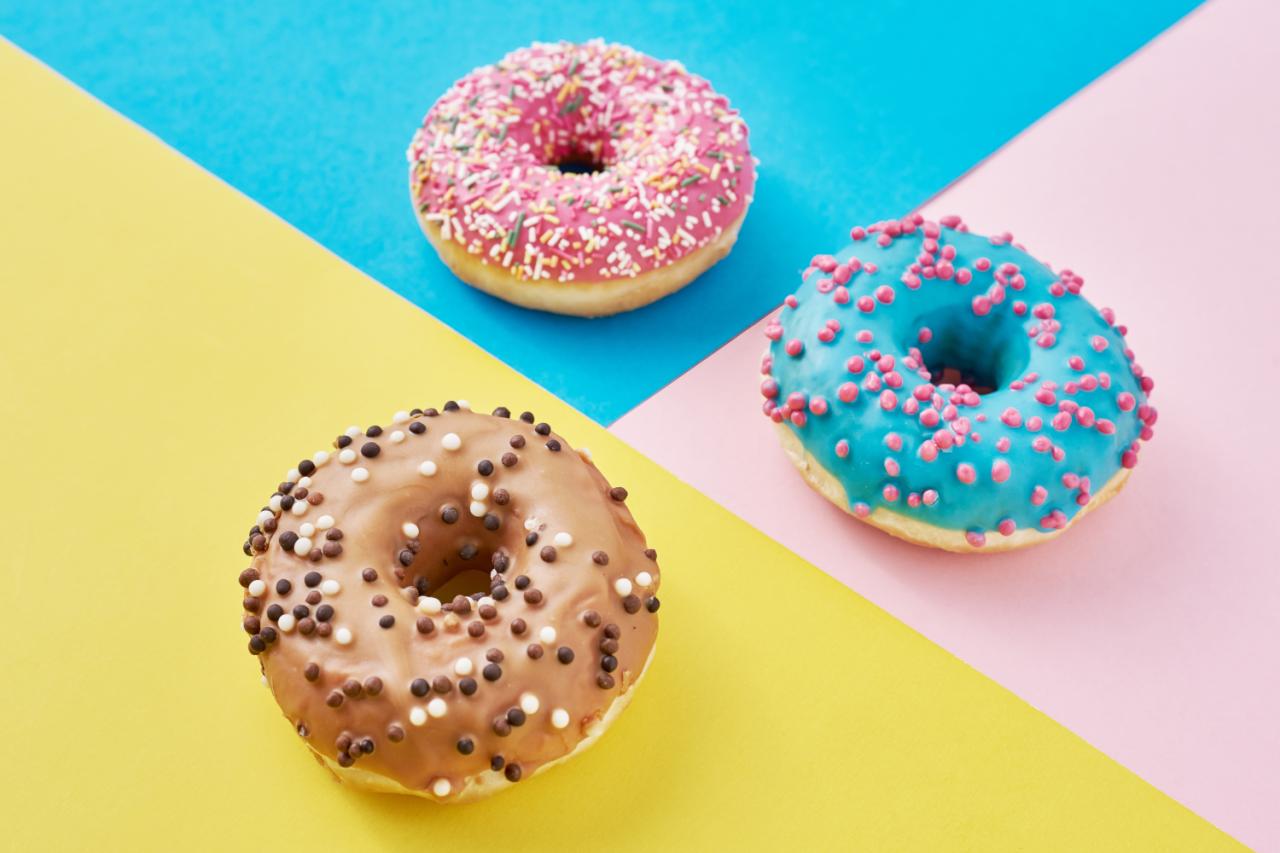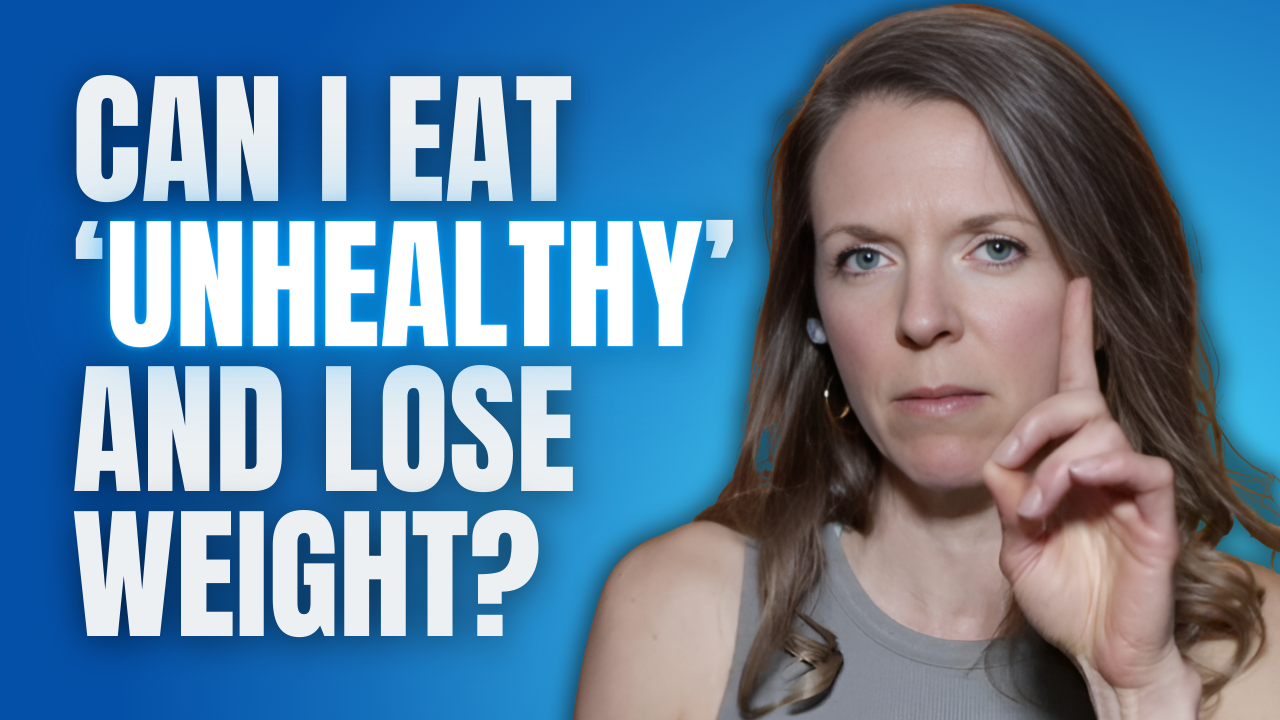
Can I Lose Weight by Eating Whatever the Hell I Want?
If you want to lose weight, you have to eat healthy and exercise, right? Wrong.
You can eat whatever the hell you want, whether it's "healthy" or not, and still lose weight.
Now, I'm not saying to run out and grab a Happy Meal. I'm saying that what you eat doesn't matter as much as you might think.
Today, we're going to dive into the question, "Can you eat unhealthy and still lose weight?"
We'll talk about the difference between healthy and unhealthy foods, how much exercise really helps—and I'll give you a strategy that is 100 times better than "eat less and move more."
Let's get to it.
First things first, let's talk about something important.
What Do "Healthy" and "Unhealthy" Mean Anyway?
Healthy and unhealthy are the labels—or rather, mislabelings—that we give to food.
When someone asks me how they can eat healthy, I remind them that there is no such thing as "healthy" or "unhealthy" food, and there's no such thing as "good" or "bad" food.
Let me explain.
Food isn't inherently good or bad, and you don't have to make an ethical decision every time you sit down to eat. If you think of food in terms of good/bad or right/wrong, you're setting yourself up for a lifetime of guilt and shame every time you "cheat" or eat "bad" food.
The labels we give food have real-life consequences.
Want To Hit Your Health & Fitness Goals Faster?
Our FREE email course is here to save the day! We'll send you 7 days of tips and strategies that are better than anything you've ever read.
In fact, if I had a magic wand, we would all stop labeling food. Instead, we'd make our food choices based on how we wanted to feel.
-- Do you want to feel satisfied and energetic or tired or sluggish?
Here's a quick example to illustrate what I mean:
I'm going to list some foods, and I want you to think about how each one makes you feel.
French fries
Apples with peanut butter
Double stuffed Oreos
Ice cream
Roasted chicken
Movie popcorn
Nachos and cheese
Hummus and veggies
If a particular food gives you energy and makes you feel satisfied, then it's probably the right choice (and vice versa). If that food makes you feel tired or sluggish after eating it, then it's a pretty good sign that it's not the best choice.
Stop labeling food as "good" or "bad" and "healthy" or "unhealthy."
Instead, start paying attention to how food makes you feel. When you do, you'll find that getting fit (and changing your relationship with food) is a lot easier than you thought.
Now that we've got that out of the way, let's answer the question, "Can I eat unhealthy and still lose weight?" more directly.
And if you'd like to listen to expert weight-loss coaches share their thoughts on how to lose weight by eating whatever you want, just click play below.

The Reason You're Not Losing Weight
The Calories In vs. Calories Out equation is a simple way to understand weight loss, but it doesn't tell the whole story.
When you eat (or drink) more calories than your body needs, the extra calories are stored as fat. On the flip side, if you eat less than your body needs, the extra calories will come from burning stored fat.
So, how does this affect us?
It means you can eat whatever the hell you want and still lose weight—as long as you consume fewer calories than your body needs for energy.
You may have heard about the professor who lost 27 pounds on the "convenience store diet." He ate Twinkies, Nutty Bars, and powdered donuts for 10 weeks, and guess what? He lost weight!
Or maybe you've heard about the pizza chef who lost 12 inches off his waist and nearly 100 pounds by eating a 12-inch pizza every day.
So, "Can you eat unhealthy and still lose weight?"
As long as it fits into your calorie budget, you can eat whatever you want—fad diet or not.
Now, I'm not suggesting that you stock up on Twinkies and pizza. But, it doesn't matter what you eat as long as you are in a deficit.
I'm also not saying that counting calories is the only thing you should care about. Focusing on calories doesn't change your relationship with food, and for most people, it's not a good long-term strategy .
Studies show that people who try to lose weight by restricting calories tend to gain more weight than those who change the habits and coping mechanisms that led them to overeat in the first place.
Since we're already talking about calories, here's another common question:
If I Eat Unhealthy but Exercise, Will I Lose Weight?
There are definitely people who have gotten in shape by eating poorly and working out like maniacs, but that's not something I'd suggest.
For one, your workouts will suffer when you eat foods that make you feel sluggish and tired. You won't have the energy to work out, and even if you do manage to drag yourself out of bed at some point, your lack of nutrition will keep you from enjoying your workout. And if you don't like it, you won't do it for long.
Exercise is important for health, but it's not a magic bullet.
You can swim, run, and hike as much as you want, but it won't help you lose weight if you eat too much. You simply can't outrun a poor diet. Weight loss is 80% about what you eat and 20% about how much you move. So if you want to get the most bang for your weight loss buck, focus on your diet.
And most importantly, figure out what's driving your eating habits. Do you eat because you're bored, nervous, or under a lot of pressure? Do you eat because you're hoping to change how you feel?
Exercise is not a substitute for changing your eating habits. So let's not ask if you can outrun your diet. Instead, let's get to the heart of the matter by asking:
-- What do you hope exercise will allow you to avoid?
When you can answer that question, you'll know what you really need to work on.
At MyBodyTutor, we help you get to the root of the problem and address it head-on. We'll work with you one-on-one to help you take control of your diet and lose weight in a sustainable way.
Schedule a free discovery call with me to learn how we can help you get past the habits holding you back.
A Better Approach Than 'Eat Less and Move More.'
When trying to lose weight, it's tempting to focus exclusively on calories. After all, they're easy to track and measure, but counting calories can lead us astray.
When you focus only on restricting calories, you fail to address the underlying causes that generate food cravings and overeating. As a result, many people who diet gain back all of their lost weight—and then some.
So, instead of taking a calorie-focused approach, use a behavior-focused approach. Pay attention to the reasons why you want to eat and find ways to deal with those things that don't involve food.
If you eat because you're bored, do something that addresses the boredom.
If you eat because you're stressed, find a way to relieve the stress.
If you eat because you're lonely, start connecting with others in your life.
If we want to change our eating habits and lifestyle choices, then we need to be clear about what's driving them in the first place. Because we can't change the things we do if we don't know why we do them.
Conclusion
So, can you eat unhealthy food and still lose weight? The answer is yes. But in order to lose weight—and keep it off in a sustainable way—we need to deal with the feelings and motivations that lead to overeating.